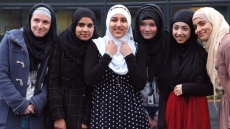“Get back in the car!” the masked people shouted at me. “Get back in!”
It was near midnight. My taxi just pulled into the parking lot where I was greeted by three masked people. They were dressed in heavy protective gear, goggles, gloves, face mask and medical gowns.
One person raised a sign saying: Do not get out of the car, please show your health questionnaire and passport. I couldn’t find mine. I panicked, asking my driver if he had it. He asked if it was in my luggage in the back trunk, and went to open the back trunk. I stepped out too, freaked out that I had just lost my passport. I was tired, lost and really hungry.
That was how I was greeted upon arrival at a centralized quarantine centre in Taiwan.
I had arrived in Taiwan to start my new job, but with the stress of moving, I'd come down with a cold. Unfortunately, I still had a cough by the time I flew to Taiwan. As a result, I was taken upon arrival to the quarantine centre rather than the quarantine hotel I'd booked.
Taiwan has been lauded around the world as a COVID-19 success story. It’s 160 kilometres (100 miles) off the mainland China coast, and because of the economic and cultural relations with the mainland, where the virus outbreak first surfaced, many feared Taiwan would be hit hard.
But more than eight months after the outbreak, the island has only had seven deaths from COVID-19 and 488 confirmed cases. How was Taiwan able to keep the numbers so low? I got to see for myself.
On my flight to Taipei, each passenger had a separate row. Flight attendants wore medical gowns, goggles, face masks and gloves. No food was served.
Because I'd showed up at the border with a cough, health authorities also took a throat swab test. Before I could get into my taxi assigned by the Taiwan Centers for Disease Control to be taken to the centralized centre, I got sprayed from shoulder downwards with disinfectant. The taxi driver, decked out in protective gear, maintained a distance.
“I don’t have COVID!” I wanted to say to him. But it seemed a moot point.
I felt only anxiety. Just 10 hours ago I was eating Nepali food with friends in a restaurant in Shanghai. Now I was being treated as a contaminant.
I'd rushed back to Beijing in early February, before China shut its borders and instituted a strict centralized quarantine for all arrivals. Life had in many ways returned to normal in the last few months. Beijing, the capital city where I had been living for two years, was as busy as ever with traffic jams and fewer and fewer people wearing masks. Offices had reopened, and I could gather with friends in restaurants and bars without fear.
But now I was crossing a border, an uncertain undertaking at a time like this. And while China considers Taiwan as its own, the island has its own government.
My experience, while jarring, was understandable to me. Many nations, my own United States included, have seemingly moved away from stringent efforts against COVID-19. The pandemic is still raging in many places, still killing people and leaving others with long-term health effects. The road ahead is long and uncertain.
After getting back into the taxi, I checked my bookbag. My passport and all my documents were in there. From that moment, everything proceeded smoothly. The next day I got my test result. It was negative. I was permitted to leave the quarantine centre for my hotel, where I would finish my isolation.





